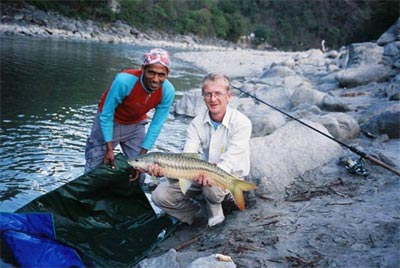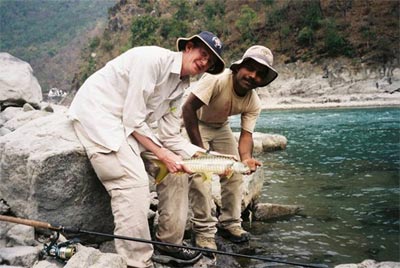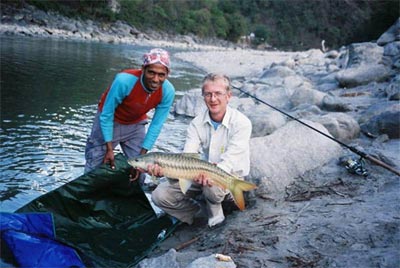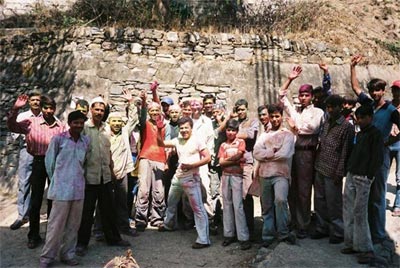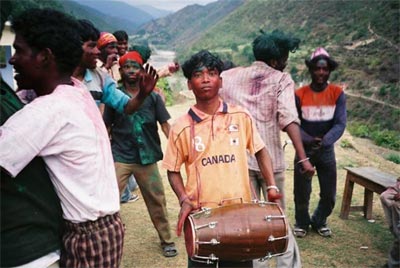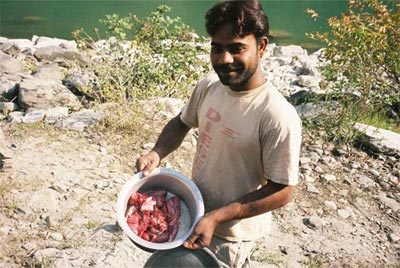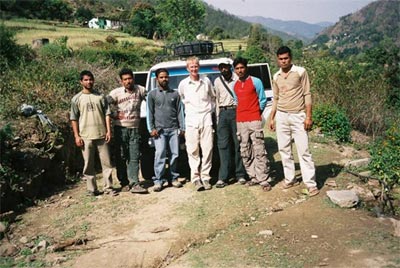| THE FOLLOWING NOTES are based on extracts from my diary over the period 7th to 21st March 2006. I’ve wrestled long and hard with the decision as to whether to publish them on the internet.
I think any fisherman is likely to be a bit reticent about revealing his favoured spots to the world, but the fact of the matter is that this particular location is no great secret. Anyone who Googles ‘mahseer northern india’ will easily be able to establish its whereabouts, and the identity of the fishing guides who ply their trade there. However the clinching argument came during a recent discussion which I had with the company that arranged this trip for me, www.otterreserves.com. In recent years luxury resorts have sprung up all over the Himalayan foothills, but especially in the vicinity of the Corbett Tiger Reserve on the banks of the Western Ramganga River. Package angling holidays booked through large European tour operators are becoming increasingly commonplace, and although some are very good, most are beyond the modest means of the general angling community. In stark contrast to Otter Reserves is a small Indian owned family business which puts a great deal of hard work into anti-poaching patrols, conservation and educating local communities on sustainable fish harvesting practices. The company is based in Dehra Dun, an ideal location from which to mount expeditions to most of the great mahseer rivers of the north, including the Yamuna, Ganges, Beas and Kali. They have also established permanent fishing camps at popular locations on the Saryu and Western Ramganga rivers. I’ve done 4 trips with them to date, so I speak from personal experience when I say that if you’re looking for an honest, reasonably priced and knowledgeable guiding service then look no further. Participants
Tuesday 7th March
Arrived at camp 3pm following an overnight sleeper from Delhi and 9 hour jeep ride feeling tired, dirty and hungry. Ablutions, rum, bath, shave, food, more rum (in that order), and I’m starting to feel human again. Did a brief recce of the fishing grounds. The camp is located beside a springfed river, the Saryu, approximately 2km upstream from its confluence with a large snowfed, the Kali. Both rivers are running very low and clear. Many fish in evidence in the Saryu. Tried a fly spoon for 1/2 hour in the evening (camp beat), hooked and then lost 1 fish ~ 11/2 lbs. Wednesday 8th March
Morning After breakfast we proceeded to the Temple at the confluence to give thanks for safe arrival, pray for big fish, and present a ceremonial bell. Fished Pool No 2 on the Saryu (Temple side), 2 fish, ~ 4lbs & 6lbs (4″plug). Returned to camp for lunch.
Fished Pool No 2 again on the Saryu (camp side), 2 fish, ~ 2lb & 3lbs (again 4″ plug). Evening Vivek seems to have gone off the idea of further discussions with the Temple officials. Even more worryingly, a rafting expedition have set up an advance camp on the confluence, intentions as yet unknown. Resolution – Tomorrow we will break camp and head down the Kali with tents. This will enable me to speak to representatives of the rafting party en route and establish their intentions. As for fishing the confluence, we’re just going to wait and see. I’m here for 14 days and I am hopeful that things will find a way of working themselves out (this is India after all…). Thursday 9th March
Morning Spin fished for approximately 2km down the Kali to the head of the second pool, 1 fish ~ 5lbs (4″ plug). Backtracked and made camp at the first pool down (approx 1km from the confluence).
Baitfished pool no 1 on the Kali with snow trout and atta paste, no fish. Packed up at midnight. Noted that the Kali rose approximately 5″ overnight, but had fallen back down by morning, a result of the previous day’s snowmelt. Friday 10th March
Morning Continued bait-fishing pool no 1 on the Kali with atta paste, again no fish. This is becoming tedious. Started to rain at midday so we packed up and headed back to the main camp on the Saryu. Afternoon It is evident that there are sections of the local community who would like to see a complete ban on all fishing at the confluence. It seems that there are 2 main reasons for this : 1) It is claimed that certain teams of unscrupulous anglers descend on Pancheshwar at peak times of the year, line up at the confluence, and pound the water relentlessly. It is alleged that many large spawning females are kept. Whether this is true or not I cannot say from first hand experience, however it is certainly undeniable that intense fishing pressure either side of the monsoons would hamper the movement of fish to / from the Saryu spawning tributary system at critical times of the year. 2) The confluence, and the 100 yard stretch of white water directly above it, are the areas where funeral ceremonies are held and the spirit of the deceased is despatched to the next place. They are considered sacred stretches of water, and many in the community are offended when fishing activities are carried out in these areas. Personally, I’m not sure what to say about it all. Nobody makes (orobserves) any proper laws, and even fewer people will give a straight answer to a straight question (especially when it comes to issues of either morality or fishing). I’ve no wish to offend anyone, but similarly I don’t see why I should be the only person to be prevented from fishing the confluence simply because I’m the only person who cares what a particular section of the local community thinks. For the time being I’m going to continue with my ‘wait and see’ policy. To put this into context, the first 5km of the Saryu have been declared a ‘mahseer sanctuary’. The effort started about 3 years ago when it is claimed that this section of the river regularly received over 30 dynamite blasts per 24 hour period. Today, there are none. The local villagers are encouraged to fish with free issue handlines on the understanding that 1 fish below 10lb in weight may be kept per family per day, and anybody seen dynamiting the river will have stones thrown at them. Remarkably it seems to be working. Many in Pancheshwar will testify that the river currently contains more fish than at any time in the last 50 years, and a big notice has been erected in the village proudly declaring ‘no dynamite – sport fishing only’. Whereas a few years ago people ate fish once a fortnight, they now eat fish once every couple of days. As a result, this is excellent fly spoon country and really good fun for those wishing to catch mahseer on a fly rod. There are large numbers of fish in the 1 – 10lb category, together with a sprinkling of grandmothers over 20lbs. If the conservation effort continues then this section of the Saryu is likely to become a very sought after fishing destination. An initiative is now underway to extend the sanctuary for a further 7km up the Saryu. This would effectively bring the ‘no dynamite’ zone to within touching distance of the point where the Saryu meets the Eastern Ramganga (another important spawning tributary of the Kali, some 16km from the main confluence with the Saryu). The Kali itself is massive. 50 to 100 feet deep in its central flow, fast, and 100 to 200 yards wide. It’s too deep for dynamite to be effective, and sparsely populated over much of it’s course. There are enormous fish in the Kali. It is estimated that 5 to 10 fish a year over a 100lbs are caught on nightlines and then discreetly traded through local markets. For the sport fisherman however, locating these large fish is a different matter. Undoubtedly, pitching up at an important spawning tributary at a likely time of year is a good starting point …. Saturday 11th March
Morning Afternoon Walked upstream from the camp to a small feeder stream to collect bait. Fished camp beat in evening with fly spoon, 1 fish ~ 2lb. Sunday 12th March
Morning Set off to pool no 2, camp side and started fishing 11am. No fish before lunch Afternoon
Switched to plug at 6pm and caught 1 further fish, ~ 3lb Monday 13th March
Morning Vivek surprised me when he emerged from his tent with a couple of porcupine quills and a cork. “Here” he said “you can make a float for catching chilwa on your day off”. On closer inspection I was astonished to discover that the cork was from a bottle of Bollinger finest champagne. “But who on earth would drink champagne in a place like Pancheshwar?” I enquired. “Ahh” replied Vivek “there is only one man who would do such a thing: Mr Boyden”. I’ve always felt that one can tell a lot about a person by their taste in champagne. On this basis Mr Boyden is clearly a gentleman of some breeding. Judging by the quantity of corks left in his wake, he is also a gentleman of considerable stamina and fortitude. I just hope that one day I shall be fortunate enough to meet the inimitable Mr Boyden and reminisce over past exploits, no doubt with a glass of bubbly, fine cigar and ample supply of beluga caviar to hand. Post diary note : following my return to Delhi I was coincidentally introduced to Mr Boyden by a mutual friend at a dinner party. I can confirm that he is everything I surmised, and more: gentleman angler, scholar, raconteur, and purveyor of culture to some of the worlds greatest civilisations. Afternoon Evening Went to the village after supper to watch dvd of Jeremy Wade’s new series ‘Jungle Hooks India’. Black & white TV run off solar power which nonetheless made for a very enjoyable evening. Most of the boys present were in it – Raj, Garnish, Deven & Hoyisher. I think they each felt deservedly proud of their contribution. Tuesday 14th March
Morning We arrived at the Judos pool 2 hours later. Thirsty after the hike, I reached into Vivek’s rucksack and pulled out a bottle of water. Upon taking a mouthful however, I was surprised to discover that the bottle contained what appeared to be vodka and tonic. “No, no” explained Vivek (whilst adding a twist of lime), “not vodka, Holi Water. Here, try some more”. The rest of the day passed in a bit of a blur. Afternoon At some point in the proceedings the river turned a dark chocolaty brown colour. Packed up at 5.30pm and headed back to camp amidst pouring rain. Wednesday 15th March
Morning
Garnish took centre stage with a large drum which he beat rhythmically whilst the rest of us danced around him throwing paint at each other. Thus, the procession passed from house to house with Holi Water and other selected delicacies available in ample abundance Afternoon We very nearly made it too. In fact, we got as far as the military base at the top of the hill which overlooks the confluence, and hence the Nepalese boarder. This is the forward operating base for D Company, 2nd Battalion of the SSB (Armed Boarder Security Force), and home to 140 or so assorted ranks. As we passed the front gates a very official looking guard informed us that the Commanding Officer had requested our presence on this most sacred of occasions, the Holi. Confronted with such a solemn and persuasive invitation we felt obliged to accept. The Commanding Officer, it transpired was a portly gentleman in his mid-50 ‘s who was wearing a pair of underpants and flip flops, and was covered from head to foot in contrasting shades of green, red and yellow paint. “Happy Holi, gentleman” he boomed as we approached him “Welcome to my camp, please forgive my nakedness, come, eat, drink, be happy”.
As convention dictated, several bottles of Old Monk Rum appeared and before I realised what was happening, generous measures of all things pleasant and bountiful were being heaped upon me. And so the Holi Water flowed, and we celebrated long and hard in the way that only soldiers can. After much merriment we eventually emerged from the military base and made our way unsteadily back to camp in the dark. Thursday 16th March
Morning A shikar conference was hastily convened and the following resolutions passed : 1) Raj to be despatched with all due urgency to Lohaghat on a liquor run. 2) The remainder of the team to refocus their efforts on the quest for a big mahseer. With the Saryu still running a dark muddy brown colour, it was agreed that our best chance would be to tackle the confluence once again. The respective merits of bait-fishing and spinning were also discussed. We duly packed the tents and headed back to the Kali, this time with the steely resolve of a professional shikar team intent on success. Afternoon Left the boys in charge of the bait-rods about 6pm and tackled the tail of the pool with a spinning rod. I’ve agreed a compromise of sorts with Vivek that I will only fish the point where the two rivers meet between sunset and sunrise. Continued fishing the confluence pool in the evening. A local hooked a large mahseer in pool no 1 of the Saryu at dusk on a handline. The fish was finally landed approximately 200 yards downstream, before being unceremoniously gaffed out of the water and spirited mysteriously away (no doubt to some worthy local charity). At the time I was fishing the tail of the confluence pool, however I witnessed events from a distance and would put its weight at 25 to 30lb. Retired at midnight – no fish. Friday 17th March
Morning Afternoon Retired at midnight. Saturday 18th March
Day 13 of the trip and I’ve just calculated that with the exception of the live-bait which we cooked at the confluence last Friday, I haven’t eaten meat for over 10 days. I’m not complaining. In fact, it’s probably done me good. Generally, I have remained in remarkably good health and found the food both nutritious and filling. Nevertheless, one does start to pine after a while for those staple meat products which are taken so much for granted in Western Europe. So it was that this morning I found myself sitting idly beside the Judos Pool dreaming wistfully of fillet steak, bacon and pork pies, when a rabbit drifted serenely passed the end of my rod. I’m sure he winked at me as he went by. I blinked momentarily (just to make sure), before springing into action. “Quick, Deven” I cried, “a rabbit”. “A rabbit Sir?” replied Deven, looking slightly perplexed. “Where?” “Over there man, in the river” I shouted, gesticulating wildly whilst rummaging in my rucksack for the skinning knife which I had so fortuitously packed a fortnight earlier. Deven needed no second prompting. With the reflexes of a tiger, he launched himself into the river and attempted to head the rabbit off before it reached the white water at the tail of the pool. Fortunately he succeeded, for had he failed we would undoubtedly have witnessed the demise of both man and rabbit. He eventually made it back to shore some 40 yards downstream grasping his prize firmly by the ears. Meanwhile, I had located my skinning knife and was making my way down the riverbank towards him. By the time I reached him the rest of the boys were in attendance, carefully drying the rabbit with a towel. “Well done, men” I announced, “now pass me the rabbit please”. I was brandishing my skinning knife expectantly, with only one thought in mind. “Sir, the rabbit is injured”. It was more a statement of fact than a response to my request. The rabbit was shivering uncontrollably and seemed to be lame in one leg. “I can see that Deven, that’s why the kindest thing to do is put it out of its misery” I countered reasonably. “Sir, I rescued the rabbit, and I think it should be given the chance of life”. I didn’t like the way this conversation was developing, so I appealed to Vivek for support. “Deven” I argued, trying to adopt as reasonable a tone as possible, “your concern for the rabbit’s well-being is admirable, but I’m sure Vivek will agree that this is not the way of a true shikari. The rabbit must be looked upon as a gift from the Gods, and as such it is our duty to ensure that they meet each other at earliest opportunity. Now please hand him over”. At this point, Vivek made a most unhelpful intervention. For the first time on the trip, I was absolutely speechless. What had happened to the noble shikar tradition? Where, I wondered, were the loyal and fearless hunters of the Himalayan Interior which I had read so much about in the months leading up to the trip? We walked back to camp in silence. We had also failed to catch any fish, but in view of superseding events that hardly seemed to matter. The debate over the rabbit resumed as soon we got back to camp and continued well into the night, until ultimately, the rabbit died of natural causes. Within half an hour it had been gutted, skinned, quartered and left to marinate in a pan of Old Monk Rum. Nothing was wasted.
My faith in the shikar credentials of the team thus restored, I retired and slept soundly, dreaming of rabbit stew. Monday 20th March
My last day of fishing, and despite the recent absence of fish and my impending departure, I awoke in excellent spirits. I learnt over breakfast that a goat was to be slaughtered in the village later in the day, so my farewell meal would be a double feast of marinated rabbit and curried mutton. Went to pool no 2 on the Saryu and bait-fished with chilwa. Fishing prospects seemed promising, but my heart wasn’t really in it. By early afternoon no bites had been forthcoming so we finished early and headed back to camp to start preparing for the evening’s entertainment. The last night is traditionally a bit of a party. It is the guest’s opportunity to thank the team for their efforts by ensuring an ample supply of rum is available, and it is the teams opportunity to thank the guest for his continued patronage by drinking as much of it as possible. Needless to say, the team didn’t let me down. If you’re ever unlucky enough to find yourself fighting in the trenches, then these are the kind of men that you want by your side. Tuesday 21st March
The jeep arrived to collect me at 10am. After a final photo-shoot and a tearful farewell, I set off on the trip back to Delhi and thereafter, England. I feel privileged to have spent a brief period of time in a place such as this, and honoured to have been surrounded by people of so noble a spirit.
Post Script Note
A great deal has been written about mahseer fishing over the years, much of it in the eloquent prose of a by-gone era. However I have deliberately refrained from quoting others in these notes. The events and experiences I have recorded are true to the best of my recollection, and the words are wholly my own. Before signing off however, I would like to make one exception. Skene Dhu published a book at the turn of the last century entitled ‘The Angler in Northern India’. In it, he writes the following lines which are as relevant today as they were then. It certainly sums up the emotions that I was experiencing as the jeep pulled away from the fishing camp and made it’s way inexorably up the mountain track, back towards ‘civilisation’. “Brawling tossing rapids, crystal clear pools, pine clad slopes and sheer rocky bluffs that tower into the blue above; even if one’s trip fails from a fishing point of view surely all the above are some recompense, and no trip can be written down an absolute failure from which one returns braced up in mind and body. And what magnificent views one can get, especially if a passing storm has cleared the air. For there is no finer sight in the world than to stand some clear day on a hill top in the Himalayas as the sun sinks to rest, and gaze on the scene before one. Far below glimmers a tiny silver thread, where some mountain stream murmurs its way to join the distant river. Tier upon tier above it rise the paddy fields, all glorious with their bladed carpets of richest emerald green, till colours blending harmoniously they merge in the deeper shades of oak and rhododendrons. Then to the horizon stretch the mighty Himalayas, range upon range of pine clad peaks and grassy slopes, bluer and softer grow the distant ranges, till sentinels of the world, tower the eternal snows. And something sublime is there in those immense peaks, silent, cold, unchanging, they seem part of another world, a world of utter desolation, colourless, pitiless, lifeless.” |
Welcome!Log into your account










